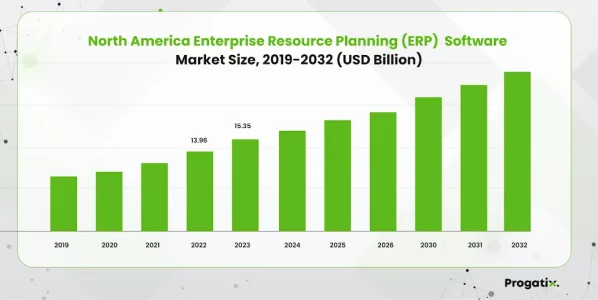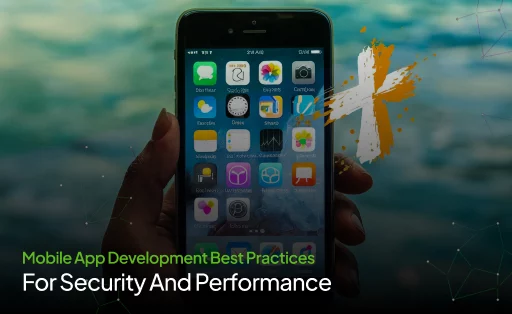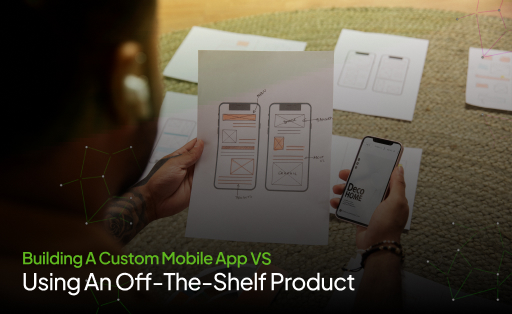What Is Mobile ERP? A Comprehensive Guide Software Development

Reaching operational brilliance, a competitive edge, and financial opportunities in this dynamic business setting is an ongoing endeavor. As the market gets increasingly crowded with startups aiming to achieve the same level of achievement, businesses must empower themselves with customized mobile ERP solutions that comply with their specific needs. Owing to this revolutionary advancement, they will be better positioned to challenge the existing situation while enhancing their place in this competitive ecosystem.
According to Fortune Business Insight, the global enterprise resource planning (ERP) software market was USD 71.41 billion in 2023. However, the market is predicted to grow from USD 81.15 billion in 2024 to USD 238.79 billion by 2032, demonstrating a CAGR of 14.4% during the forecast period.
Since the requirement for simplified and optimized operations management has expanded, businesses must deliberate on investing in Mobile ERP systems as a strategic move. These systems strengthen organizations to simplify processes, boost productivity, and institute a competitive advantage. By leveraging the competencies of mobile technology, businesses can suitably access critical data and perform crucial tasks while on the move, leading to enhanced decision-making and improved operational efficiency.
What Is Mobile ERP?
Mobile ERP means business users can access ERP software through their mobile devices, including smartphones and tablets, from any location and at any time. As such, they can effortlessly get the required information to finish their tasks more efficiently, add data at the point of capture to simplify workflows, and process transactions to bring in more profit. Using the same real-time data over a centralized platform, it enables executives and team leaders to manage important everyday company operations. Another benefit is the prompt detection of workflow inadequacies, supply chain challenges, and potential cash flow disruptions, which can then be succeeded and/or resolved before they become bigger matters that influence customers and businesses similarly.
The Significance of Mobile ERP Solutions
Enterprise Resource Planning (ERP), an all-inclusive software solution effortlessly integrates key business functions such as accounting, human resources, supply chain, customer relationship management (CRM), and more. The feature of an ERP to automate and integrate process optimization help companies in managing and controlling end-to-end operations, encouraging increased productivity, profitability, effectiveness, and overall growth.
For organizations seeking to preserve a competitive business edge, an ERP software offers numerous advantages. ERP’s mobility feature along with these advantages offer businesses better service quality, stronger business relationships, and improved data accuracy. Mobile ERP applications also enable users to easily access crucial data from any location at any time.
In the contemporary business landscape, staying linked and agile is the key, making mobile ERP apps a vital asset helping companies adapt more effectively to the evolving remote work trend and a worldwide distributed workforce. Irrespective of time or location, these applications provide greater visibility throughout departments, providing users’ smooth real-time access to the ERP system using any mobile device.
Mobile ERP solutions are basically designed with an aim to provide seamless accessibility on mobile devices like smartphones and tablets, delivering improved flexibility for users to easily access and engage with ERP functionalities while on the go.
Businesses get to use the power of mobile technology through ERP which allow users to stay linked, make informed decisions, and execute critical tasks from any location, thus enhancing overall productivity and receptiveness.
Now that the use of mobile apps in ERP is clear let’s move forward and examine the different types of mobile ERP solutions that are accessible across the markets.
Need Mobile ERP? Hire Top Developers Today
Let's Connect
How Does Mobile ERP Work?
An important ERP trend for the predictable future, mobile ERP serves as a gateway into an ERP system. Using any mobile device maintained by the ERP application and depending on the ERP itself, employees are allowed to do anything on their desktop computers o, including order tracking, financials monitoring, dashboard viewing, and reports generating. Mobile ERP is usually connected to a cloud ERP back-end system using a secure API that distributes the requested Information and services to the mobile device. Workers are normally allowed access only to the features and functionalities required to do their jobs, improving data privacy and security.
Types of Mobile ERP Software that Can Benefit Businesses
Businesses need to design a custom mobile ERP solution that aligns with their business requirements and industry standards. Here are the numerous types of mobile ERP solutions that you can develop:
-
Marketing automation system
These mobile applications allow marketers to schedule and automate their campaigns, resulting in effective tracking of employee or partner activities and improved customer service.
-
Enterprise resource planning
Utilizing mobile apps in ERP systems assists in generating organized employee plans, enabling effective task completion, and improving overall operational productivity.
-
Automated billing system
This solution strengthens companies by making customer charging easy while managing multiple invoices effectively. It simplifies transaction tracking and improves overall billing management.
-
HR management
This software helps track employee performance, provide feedback, and simplify HR team tasks and goals. By automating repetitive work, promoting collaboration, and optimizing processes it improves the efficiency and performance within the HR department.
-
Message and collaboration system
Allowing employees to utilize productivity tools makes communication, task tracking, and file sharing seamless, ultimately strengthening teams to work proficiently and stay aligned on future tasks.
-
Email marketing system
It strengthens companies’ by personalizing communications and making marketing campaigns effective by sharing targeted emails and messages with customers based on location and preferences. Some of the mobile ERP apps that manage emails are Zaper, Odoo, Asana, etc.
-
Integrated mobile workforce management
Mobile ERP by merging advanced mobile devices, applications, and software, provides employees an access to the crucial information required to complete their tasks anytime and from anywhere. It results in improved workforce, productivity and efficient remote collaboration.
-
Customer relationship management
CRM software lets businesses manage customer interactions, maintain service logs, and generate insightful reports. By improving customer experiences and making significant sales growth it helps businesses make timely adjustments to existing plans or systems.
Features of a Mobile ERP Solution
For organizations to manage their operations from any location, the best mobile ERP solutions should have several features as their desktop substitutes. An optimized Mobile ERP system has a collection of features that cater precisely to the dynamic requirements of contemporary businesses. These features ease on-the-go ERP access, ensure compatibility throughout several devices, and integrate with advanced cloud storage solutions by prioritizing utility and performance. Let’s look into what makes mobile ERPs different in the ecology of mobile technology.
-
Simplified Cloud Storage Integration
At the forefront of innovation, cloud storage ERP allows you to travel with your data, freeing you from the limitations of physical servers. The integration is so simplified that it becomes an addition to your mobile devices, providing the liberty to manage and analyze your business data from anywhere at any time.
-
Agile and Responsive Design
Today’s business market is fast-driven and demanding. An ERP mobile app with an agile and responsive design ensures that your operations can sustain prompt changes. This flexibility strengthens your business’s ability to adapt strategies and processes quickly, guaranteeing that responsiveness becomes a symbol of your operations.
-
Universal Approachability and Device Agnosticism
With ‘work from anywhere’ in mind, platform-independent ERP solutions offer simplified access from any device, making it convenient to stay connected to your work. Whether you’re on a tablet, smartphone, or laptop, the ERP functions effortlessly across all platforms, assisting ‘Bring Your Own Device’ (BYOD) policies and creating an adaptable digital workspace for everyone.
Advantages of Implementing Mobile ERP
Mobile enablement has gradually become a standard software feature due to the increase in remote work throughout the world specifically after the COVID period. Reflecting the ERP systems on which they depend, mobile ERP provides a number of business benefits that can result in amplified revenue, reduced costs and greater profitability.
-
Access to Real-Time Information
The business world moves rapidly, and companies must move just as fast. Mobile ERP facilitates employees’ access to real-time data gathered from across the organization and kept in a central database so that every division is working with the same details. Having the most up-to-date data at their convenience, salespeople, for instance, can regulate product accessibility, field technicians can download the latest measures for maintaining hardware, and accountants can track payments.
-
Better User Experience
A well-designed mobile interface that optimizes the ERP’s layout for best observing on a mobile device’s screen makes it convenient for employees to lead the system so they can achieve their workflow tasks, enhance their response times, and keep business running smoothly. Around-the-clock access, offline competencies, and personalized interfaces are extra ways to improve the user experience.
-
Maximzied Productivity
Employees could carry out these tasks and many more immediately with their mobile ERP rather than commuting to their tables to review papers, record purchase data, work on a budget, or answer client concerns, enabling employees to make the most of their time. Consider a salesman who has ten minutes before an appointment to review the customer’s previous purchases by logging into the mobile ERP. Furthermore, it accelerates processes, minimizes response times, and provides staff members more time to work on other projects.
-
Enhanced Collaboration
In personal and professional lives, people are habituated to connecting to the internet and to coworkers from their networks using their mobile devices. Mobile ERP is built on this conduct. Mobile ERP makes it easy for employees in extensive locations and different departments to innovate on projects, share documents, and advance approval processes. Besides, automatic notifications can alert workers when messages arrive or tasks need their attention, which also improves collaboration.
-
Scalability
Business expansion and success go hand in hand. Mobile ERP, an element of cloud-based ERP software, may quickly expand to deal with additional users, new features, simultaneous workloads, and continuously increasing data volumes without affecting system performance.
-
Cloud Storage
Speaking about the cloud, companies that use cloud-based ERP engage their cloud providers with maintaining storage servers and other storage infrastructure. Mobile ERP users may securely access real-time encrypted data at any time and from any location. Maintenance, data backup and recovery, software upgrades or modifications, and regulatory compliance are all within the scope of the cloud vendor.
-
Business Agility
Companies that adapt rapidly to the ever-evolving business environment experience an upsurge in financial and operational performance, improvement, decision-making speed, and customer satisfaction. The key to this agility, which also assists businesses in taking advantage of new opportunities and overtaking their competitors, is for decision-makers to have 24/7 access to real-time data and to each other, and mobile ERP allows both.
-
Streamlined Supply Chain
Companies are under constant pressure to firmly manage their global supply chains, a pressure intensified by the COVID-19 pandemic and progressively refined cyberattacks. Supply chain management needs uninterrupted, end-to-end visibility across vendors, customers, warehouses, and partners to ward off any possible interruptions that could influence the ability to source, produce, or deliver quality goods and services as cost-efficiently as possible. Mobile ERP enables businesses to unite with their supply chains, identify weak links, and simplify operations.
Start Using Mobile ERP For Greater Productivity
Let's Connect
Challenges related to Mobile ERP
For all of mobile ERP’s several benefits, businesses may come across a few technical challenges to navigate, particularly when trying to upgrade mobile enablement to legacy software. System compatibility, security, and the scope of work that can be done on a small screen are all that can face challenges. Here are some things to consider when running a business.
-
Compatibility Issues with Existing ERP Systems
Inconsistencies between a mobile ERP and current infrastructure and software can generate data silos, interrupt business processes and expand costs owing to the requirement for custom solutions. Companies must confirm compatibility and then launch a small preliminary project to make sure that the mobile ERP works as planned.
-
Security Concerns Associated with Mobile Devices
Mobile ERP needs strong security guarantees. Not only can mobile devices be stolen or lost, but every device and connection over the public internet develops a business’s attack surface. To reduce security risks, companies must add multi factor authentication, impose end-to-end encryption and have the knack to exclude suspicious mobile users.
-
Possible Restrictions in Functionality Compared to Desktop Versions
The ERP being used dictates the scope of a mobile ERP’s capabilities. The practicality and efficiency of the mobile ERP has limitations if it fails to exceed the full potential of its desktop version. Solutions to close the gap involve maintaining middleware, creating custom interfaces, or coming up with a plan for data migration and coordination. But it comes with additional costs and require a lot of time and resources.
How cloud-based ERP solutions are developed for mobile?
Here are the key stages that must be carried out effectively to develop a robust mobile ERP solution that is capable of handling user requirements:
-
Requirement Gathering
The Early phase of ERP mobile application development includes comprehensively comprehending the client’s needs and business objectives for the mobile ERP app. This involves the identification of specific functionalities, features, and integration needs required for the app’s success.
-
Planning and Design
This stage involves the app development team to devise an exhaustive plan and design for the mobile ERP app. Besides, it includes defining the app’s architecture, designing user-friendly and visually engaging user Interfaces, while ensuring an ideal user experience.
-
Development
The development phase involves adept coding of the mobile ERP app in compliance with the decided design. Developers expertly utilize programming languages, frameworks, and leading development tools to idea the app’s front-end and back-end constituents.
-
Quality Assurance
Quality assurance and testing are the essential stages that assures the mobile ERP app functions as per the needs. Diverse testing methodologies, such as functional testing, performance testing, and compatibility testing, are skillfully employed to recognize any bugs or concerns come across in the app’s processing.
-
Deployment
Once the app productively finishes the testing phase, it is ready for deployment. This involves organizing the app for scattering through app stores or enterprise deployment channels.
-
Maintenance and Updates
Post-deployment, unremitting maintenance, and updates are required for the mobile ERP app to gain power in the market and work according to evolving business requirements. This phase of ERP mobile application development includes timely bug fixes, feature improvements, and compatibility updates to adjust to the developing mobile platform setting.
The Cost Required to Build Mobile ERP Software Solutions
The price range for developing a custom mobile ERP app is roughly between $40,000 and $200,000. The intricacy of the entire program is one of the key elements affecting the development budget. For instance, creating a comprehensive mobile ERP system with an extensive feature set in line with existing market trends could cost you more than developing a basic cloud-based solution with limited capability. A few more variables that influence the cost of creating cloud-based mobile ERP systems are:
- Location of the app development agency
- The size of the hired team
- App’s UI/UX design
- The basic app platform
- Features and tech stack
- Essential app maintenance and updates
It’s essential to acknowledge that outsourcing models provide clients with a significant financial benefit, but it’s also necessary to remember that the cost of developing ERP mobile applications could vary by region. Hourly development prices can range from $30 to $40 in Asia to as much as $100 to $120 in Tier 1 nations like the US.
It’s also crucial to realize that a precisely preferred tech stack ensures that the mobile ERP solution works at its full potential and offers an excellent user experience. The use of efficient programming languages, frameworks, and libraries, can build an application that can manage intricate transactions, calculations, and data processing, improving performance on every level.
Having an ERP system can provide several benefits to businesses, such as improved collaboration, increased agility, and better customer experience. But enterprises must recall the importance of selecting a secure and trustworthy custom mobile ERP solution company that can provide an ERP that efficiently manages their daily processes. With more organizations becoming digitally transformative, the significance of mobile ERP solutions in the future will develop more making it a crucial tool for success.
How can Progatix Help Businesses Improve Operational Efficiency with ERP?
If you are a business owner seeking to simplify your daily business operations with ease and at everyone’s convenience, then Progatix is the right stop for ERP development services. Our skilled professionals understand your business demands and use the latest technologies and industry best practices to build a mobile ERP system that aligns effortlessly with your goals and fulfills your business specific requirements. Contact our professionals to design ERP solutions at economical costs.
Transform Your Operations With Mobile ERP Solutions
Let's Connect



 Let's Discuss Your Tech Solutions
Let's Discuss Your Tech Solutions 






